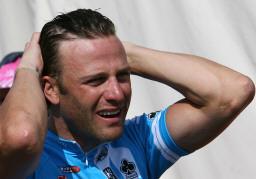World sport's top court on Tuesday handed Italian cyclist Alessandro Petacchi a year's ban for using a stimulant in last year's Giro d'Italia.
The Court of Arbitration for Sport (CAS) in Lausanne overturned an acquittal issued by the Italian Cycling Federation (FCI) two months after the Giro finished.
The 33-year-old sprint star has a medical certificate authorising him to use the substance, salbutamol, for his asthma condition.
Many professional cyclists claim they have asthma.
Last July the FCI accepted Petacchi's defence that the high levels of salbutamol registered in a test were accidentally caused by the cyclist taking too many puffs on his inhaler.
But prosecutors from Italian sports supreme body, the Italian Olympic Committee (CONI), appealed the verdict to the CAS, asking for a one-year ban.
Petacchi was put on 'non-active' status pending the FCI verdict and so the TAS ban will end in August - still too late to take part in this year's Tour de France.
Last year's probe also scotched his ambition of adding to his tally in the Tour, which despite his recent dominance of sprinting was stuck at just four stages in 2003.
Nicknamed 'Ale-Jet', Petacchi took over the mantle of world's top sprinter from fellow Italian Mario 'Lion King' Cipollini four years ago.
His explosive speed has seen him take several stage victories in all three of the Grand Tours (Giro d'Italia, Tour de France, Vuelta a Espana).
In 2004 he won a record nine stages at the Giro d'Italia and in 2005 scored his first victory in a major Classic race, triumphing at the Milan-San Remo.
He withdrew from the 2006 Giro d'Italia after crashing during the third stage. It was subsequently discovered that he had finished the stage with a fractured kneecap.
He won five stages in last year's Giro.
Petacchi's ban came on the same day Spanish rider Patxi Vila Errandonea, a mainstay of the Milanese Lampre team, was pulled from the upcoming Giro after a surprise dope test found unusually high levels of testosterone in his blood two months ago.
Several top Italian cyclists including the last two Giro winners Ivan Basso and Danilo Di Luca have been through the doping mill.
Basso is serving a two-year ban for his involvement in a Spanish doping probe while Di Luca was cleared last month of doping charges that could have led to a two-year ban.
Italian sport's ultimate arbiter, CONI's Judge of Last Instance, ruled prosecutors had not met the required standard of proof against Di Luca.
According to news reports, Di Luca, 32, had hormone levels normally associated with those of a child.
Italian authorities wanted to determine whether the abnormal results were the natural consequence of racing at altitude for three weeks, or some kind of masking agent.
Di Luca has just served out a three-month ban imposed in a separate case and is expected to take part in this year's Giro which starts on Saturday.
The shorter ban was inflicted because of the rider's long-standing links to an Italian doctor suspected of providing performance-enhancing drugs.
The rider has taken that case to the CAS.
He has also threatened to take legal action because the ban - which he has just served out - prevented him from winning last season's ProTour competition.
The doctor, Carlo Santuccione, has been implicated in the notorious Oil for Drugs investigation.
Italian sports prosecutors also say Santuccione gave drugs to several other cyclists as well as former world pole vault champion Giuseppe Gibilisco, who received a two-year ban in October.
PETACCHI LATEST IN LONG STRING OF CASES.
Petacchi's case is the latest in a sport that has been ravaged by scandals in recent years.
Both Basso and another 2007 pre-Tour favourite, Germany's Jan Ullrich, were forced to pull out before the race because of their involvement in a Spanish doping probe.
Ullrich subsequently retired from the sport.
The rider who took over the favourite's mantle, Alexandre Vinokourov of Kazakhstan, went on to test positive for blood doping near the end of the race and faces a two-year ban.
He was one of three riders pulled from the 2007 race for doping including race leader Michael Rasmussen of Denmark.
Italy's Cristian Moreni got a two-year ban after testing positive for the male sex hormone testosterone after the 11th stage of the race.
The 2006 Tour winner, Floyd Landis of the USA, was stripped of his title and banned for two years after tests found an excessive testosterone level during a race stage.
Fellow American Tyler Hamilton, the 2004 Olympic winner, received a two-year ban for blood doping in 2005.
Last year the 1996 Tour winner Bjarne Riis of Denmark became the first Tour winner to admit to using banned substances during his career.
Doping's most illustrious, and ultimately tragic, victim was Italy's Marco 'the Pirate' Pantani.
Pantani's career peaked when he won the Tour and the Giro in 1998, emulating legends like Fausto Coppi and Gino Bartoli - only to take a downturn into doping scandals when he was thrown off the 1999 Giro on the eve of winning it again.
After several aborted comebacks that disappointed his legions of fans, he died of a cocaine overdose in 2004.









